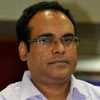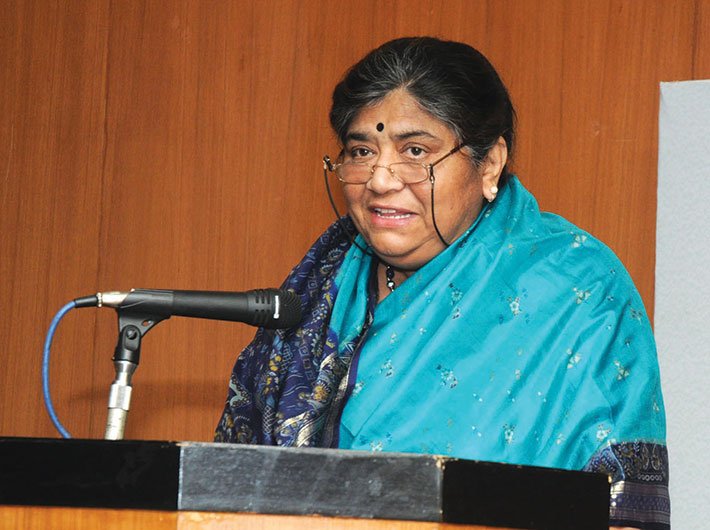Congress vice-president Rahul Gandhi has been questioned by both the opposition and the judiciary for his alleged comments which accuse the Rashtriya Swayamsevak Sangh for Mahatma Gandhi’s assassination. Mridula Mukherjee, author of RSS, School Texts and the Murder of Mahatma Gandhi: The Hindu Communal Project, provides a nuanced view on the subject. Mukherjee, also a former director of Nehru Memorial Museum and Library, explains at length to Pankaj Srivastava the context of the Mahatma’s murder and the RSS role in creating that context.
What was the role of the RSS in the assassination of Mahatma Gandhi?
First and foremost, the RSS created the atmosphere of hate and violence in which the assassination became possible. There is no doubt that the communalised atmosphere created by the riots, migrations and massacres that accompanied partition was extremely conducive for the growth of Hindu communalism. Strident anti-Muslim propaganda, instigation and organisation of riots, demand for a Hindu state and a call to overthrow the government and hang the national leaders reached a climax in January 1948, just before the assassination of Gandhi. Hostility towards the Congress, towards Gandhiji, had been promoted over the years but now there was a significant qualitative and noticeable escalation in the language of vituperation. The Hindu Mahasabha did not celebrate the attainment of independence and declared August 15, 1947 as a day of mourning. It refused to accept the national flag, upholding the bhagwa jhanda as the only flag worthy of veneration. The Congress, as the ruling party, was repeatedly pressurised to declare the state a Hindu rashtra.
Many members of the RSS actively participated in the post-independence riots. By January 1948, a ‘mass of information’ was available to the government about its ‘close association with riots and disorder’.
If RSS had no connection to the Gandhi assassination, why was it banned immediately after the event? The ban order clearly lays out why it was being banned. Sweets were distributed by RSS and Hindu Mahasabha workers after the murder.
Sardar Patel had held the Hindu Mahasabha responsible for Gandhiji’s murder. Then why was Vinayak Damodar Savarkar let off?
In January 1948, when Gandhi was assassinated, Savarkar was arrested as he was suspected of being the mastermind behind the conspiracy. He was eventually exonerated in the trial for lack of evidence to corroborate the testimony of the approver, a technical point of criminal law. Sardar Patel, being a fine criminal lawyer, was personally convinced of Savarkar’s guilt; otherwise he would not have agreed to put him up for trial. He told Jawaharlal Nehru in unambiguous terms, “It was a fanatical wing of the Hindu Mahasabha directly under
Savarkar that [hatched] the conspiracy and saw it through.”
When the Commission of Inquiry set up in 1965 under justice Jeevan Lal Kapur, a former judge of the supreme court, gave its report, it came to the following conclusion, “All these facts taken together were destructive of any theory other than the conspiracy to murder by Savarkar and his group.”
The Kapur Commission had access to a lot of evidence which was not available to the trial judge. Two of Savarkar’s close associates, AP Kasar and GV Damle, who had not testified at the trial, spoke up before the Kapur Commission, now that Savarkar was dead, and corroborated the approver’s statements. If they had testified at the trial, Savarkar would have been proven guilty.
What was the relationship between the Hindu Mahasabha and the RSS?
RSS and Hindu Mahasabha were at pains to show that they had nothing to do with each other. The RSS also asserted repeatedly that they had nothing to do with the conspirators behind Gandhiji’s murder, indeed with politics altogether. This calls for suspension of belief. It is well known that the separate existence of the two organisations meant only a division of labour towards the same end. RSS and Hindu Mahasabha members worked together, the former building the ideological bases, the latter being the formal political party. This overlap between the RSS and Hindu Mahasabha is clear from the report of the Kapur Commission. The Kapur Commission notes that “there is evidence to show that many RSS members were members of the Hindu Mahasabha”. Morarji Desai deposed before the Jeevan Lal Kapur Commission that “at that time Hindu Mahasabha and the RSS were working together”.
A report on the activities of the RSS, dated September 17, 1947 stated, “Most of its prominent organisers and workers are either members of the Hindu Mahasabha or sponsors of the Hindu Mahasabha ideology.... Because it was associated with Hindu Mahasabha its policy was considerably influenced by the Sabha ideology.”
Intelligence reports also testify to the nexus between the RSS and the Mahasabha. For example, the Intelligence Bureau’s note on the RSS dated May 18, 1942 said: “The policy of the Sangh is influenced to a considerable extent by its association with the Hindu Mahasabha. Exactly how closely the Sangh is connected with the Hindu Mahasabha is not known, as no public reference to its association is ever made by the leaders of either organisation. That it is close, however, is clear from the respect with which Hindu Mahasabha leaders such as VD Savarkar and Dr BS Moonje are treated by the Sangh and the authority with which they make public pronouncements regarding the Sangh.”
The links between the Hindu Mahasabha and the RSS were as close as those between the RSS and the BJP today, or between the Jan Sangh and the RSS from the 1950s to the 1970s. Jan Sangh and BJP are the successors of Hindu Mahasabha. When the Hindu Mahasabha became tainted by virtue of its links with the murder of the Mahatma, it was sidelined and Syama Prasad Mookerjee, who himself was a major leader of the Hindu Mahasabha, formed a new party, the Jan Sangh. Otherwise, why would a well-known organisation virtually obliterate its own existence and its leaders set up a new political party?
RSS people always claim Nathuram Godse had left the organisation in the early 1940s. Is it true?
Nathuram Godse was and remained in the RSS. His brother, Gopal Godse, after his release from jail on having served his sentence for his role in the Gandhi assassination, gave an interview to Frontline. In this, he criticised LK Advani for distancing himself from Godse and saying he had nothing to do with the RSS. He categorically stated that Nathuram Godse was in the RSS and never left the RSS. We know that the RSS deputes people into the BJP, like Ram Madhav today. Now if Ram Madhav does something and the RSS says we have nothing to do with him, it would be a travesty of truth. In fact, many ministers in the BJP government today are from the RSS. They have not left the RSS after joining the BJP. You would recall that it was the issue of refusal to give up dual membership which had led to the former Jan Sangh members of the Janata Party to split and form the BJP.
Gandhi was a very religious person. Then why were ‘Hindutvawadis’ against him? Is Hindutva a political project?
Why was Gandhiji the target of Hindu communalists? Why did fear, anger, hatred, awe centre on him above all? One answer is that he was seen as pro-Muslim. At another level, there was the fear that Gandhiji’s swaraj, conceived as Ram rajya, would be the main obstacle in the achievement of Hindu raj. The cry of Muslim raj could be countered by Hindu raj, Pakistan with Akhand Hindustan. But what could be the answering cry to Ram rajya? Why would Hindus rally behind Hindu raj when promised the ideal society par excellence, Ram rajya? Gandhiji could reach those with a religious bent of mind with his own interpretation of Hinduism as a humane, compassionate, peaceful religion, in harmony with other faiths. He was also a reformer of Hinduism, and worked incessantly to rid it of oppressive practices such as untouchability and unequal status of women. He could not be dismissed as somebody who was alienated from Indian culture, and therefore he was perceived as the biggest obstacle to the Hindutva project. Hence, the supreme irony, that the votaries of Hindutva targeted the greatest living Hindu.
feedback@governancenow.com
(The interview appears in the September 16-30, 2016 issue)

